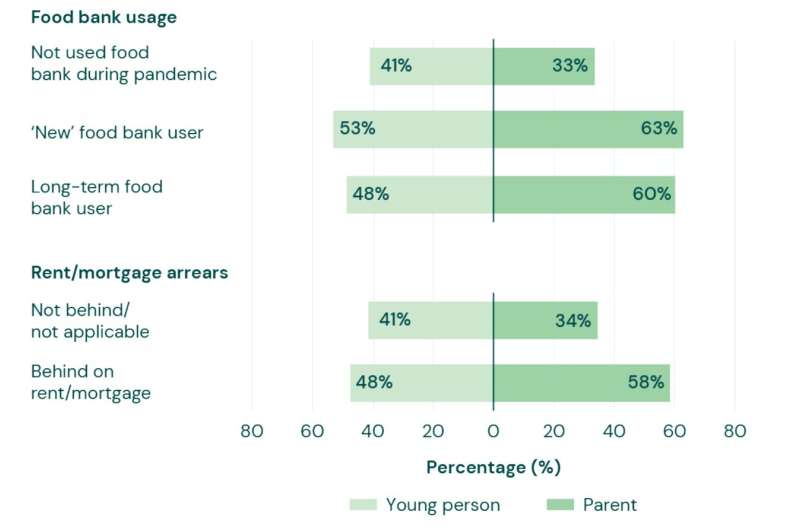This article has been reviewed according to Science X's editorial process and policies. Editors have highlighted the following attributes while ensuring the content's credibility:
fact-checked
trusted source
proofread
Lower GCSE grades for children in families relying on food banks

Children living with long-term poverty and whose families rely on food banks are more likely to achieve lower GCSE grades, finds a report co-authored by UCL researchers.
Pupils in these families achieved half a grade lower per subject than they would be expected to, even taking previous grades and other aspects of household finances into account. The authors say this raises concerns about the long-term impact of the cost-of-living crisis.
The study also found that just over four in five (81%) of parents and more than half (54%) of young people in families struggling financially report poor mental health. One in ten young people live in households classed as 'food insecure', meaning they lack reliable access to enough affordable and healthy food.
The COVID Social Mobility & Opportunities (COSMO) study is jointly led by the UCL Centre for Education Policy & Equalising Opportunities (CEPEO), the UCL Centre for Longitudinal Studies and the charity Sutton Trust. The study, the largest of its kind, is tracking the lives of a cohort of 13,000 young people in England who are taking A-Levels and other qualifications in 2023.
The report, published by the Sutton Trust, finds that rates of poor mental health were particularly bad for those whose financial situation has worsened since the pandemic. Nearly two-thirds (63%) of parents and over half (53%) of young people who started using food banks during the pandemic reported poor mental health, compared to 33% of parents and 41% of young people who had not.
Overall, 39% of households reported a worse financial situation than before the pandemic, with just 16% reporting that their finances had improved. Those reporting a worsening financial situation were most likely to have had fewer resources before the pandemic.
Lead author Dr. Jake Anders, Deputy Director, UCL CEPEO, said, "The mental health and life chances of young people and their parents are being dramatically affected by post-pandemic cost of living pressures. And these impacts are likely to be long-lasting, given the seeming link between food insecurity and performance in exams."
"That so many are food insecure but would not be considered eligible for free school meals under current rules suggests that the eligibility criteria are in need of urgent review. No young people should be going hungry, especially if this has the potential for serious long-term impacts."
Well over half (57%) of households in the study where young people went hungry were not eligible for Free School Meals (FSM) and 36% of those using food banks were not FSM eligible either. The findings raise questions of whether eligibility is set at the right level, particularly given the rising cost of food.
Overall, one in ten young people were living in households which were classed as food insecure, with many reporting running out of food and skipping meals. Some parents (5%) even reported going an entire day without eating. Rates of food insecurity were highest in the north east and north west of England (at 15% and 12%) compared to the south east (9%) and east of England (7%).
Sir Peter Lampl, Founder & Chairman of the Sutton Trust and Chairman of the Education Endowment Foundation, said, "The link between financial insecurity, mental health and academic attainment is very concerning. Young people have already faced many challenges due to the pandemic, and now they and their families are facing serious financial pressures due to the cost-of-living crisis."
"Unless action is taken, there is likely to be a worsening of mental health which will affect a whole generation. The government should review financial support for families and boost investment in schools so that vulnerable children are not left behind."
More information: Report: cosmostudy.uk/publication_pdfs … and-the-pandemic.pdf
Provided by University College London





















